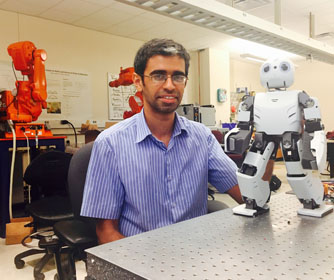UTSA professor receives grant to create more versatile legged robots

Pranav Bhounsule with a test robot for his students in his UTSA laboratory.

Pranav Bhounsule with a test robot for his students in his UTSA laboratory.
(May 2, 2016) -- Pranav Bhounsule, assistant professor of mechanical engineering at The University of Texas at San Antonio (UTSA), has received a $160,000 grant from the National Science Foundation to continue his top-tier research on bipedal robots. Bhounsule, head of UTSA’s Robotics and Motion Laboratory, plans to create algorithms that enable legged robots to balance themselves while handling difficult terrain, an asset most robots currently lack.
“We’re striving to create a robot that is as efficient as it is versatile,” he said. “If you want a robot that can help out in your home, you will need it to walk in environments that are cluttered or have stairs.”
Bhounsule noted that humans have developed smart control techniques that allow us to balance, turn and travel across complex terrains on legs. Most Robots, however, move using wheels.
“Wheeled robots generally can tackle a flat or slightly hilly terrain, but that is about it,” Bhounsule said. “If there’s some kind of leak in a nuclear plant and it’s too dangerous for humans to be sent in to deal with, you’ll need a robot. But in those kinds of situations, there’s going to be debris and stairs because those environments are created for humans.”
The solution? A bipedal robot that can move the way a human does.
Bhounsule has already created a robot that can walk on two legs for 40 miles on a single battery charge.
“If we’re going to have a robot working in a dangerous situation for extended periods of time, we’re also going to need one that doesn’t need to be constantly recharged,” he said. “A trained person can probably do a marathon without eating or drinking very much, but robots are sluggish and fall down, and need constant recharging.”
Bhounsule created his energy-efficient robot by having the motors guide the motion of its legs, exploiting their natural inertia, rather than forcing them to move in unnatural ways.
Now Bhounsule is optimizing the ability to turn and travel across a rough and rugged terrain while being energy-efficient. He hopes his research will produce a robot that can do both of these things, as well as move faster. He admits, though, that he won’t be quite satisfied until he creates a robot that can do parkour.
“The plan is to try to take this one thing at a time,” he said. “We’ll have speed, versatility, and long battery life. These aren’t trivial things. But we’ll get there.”
-- Joanna Carver
Public Affairs Specialist
----------------------------
Learn more about the UTSA Robotics and Motion Laboratory.
Learn more about the UTSA Department of Mechanical Engineering.
Connect online at Facebook, Twitter, YouTube, Instagram and UTSA Today.
Events
Fiesta Arts Fair features contemporary art from more than 100 artists from across the U.S., Fiesta favorite foods, drinks, live music by local and regional performers, and a Young Artists Garden providing opportunities for budding artists to learn, explore and express their creativity.
UTSA Southwest CampusJoin the PEACE Center and Wellbeing Services for Denim Day, a day of learning about the importance of consent and why we wear denim on the last Wednesday of the month each April during Sexual Assault Awareness Month. Stop by our Denim Day display to take a photo in front of our Denim Wall, spin the "Is It Consent?" Wheel, and get a Concha or goodie.
Student Union Window Lounge, Main CampusLearn to use Zotero®, a citation manager that can help you store and organize citations you find during your research. Zotero can generate bibliographies in various styles, insert in-text citations and allow you to share sources with collaborators.
Virtual EventThis event is to achnowlege the graduating seniors and induct the new cohart of scholars to our program.
North Paseo Building (NPB 5.140,) Main CampusCelebrate the accomplishments of College of Education and Human Development, College for Health, Community and Policy, College of Sciences and University College.
AlamodomeCelebrate the accomplishments of Alvarez College of Business, College of Liberal and Fine Arts and Klesse College of Engineering and Integrated Design.
Alamodome

